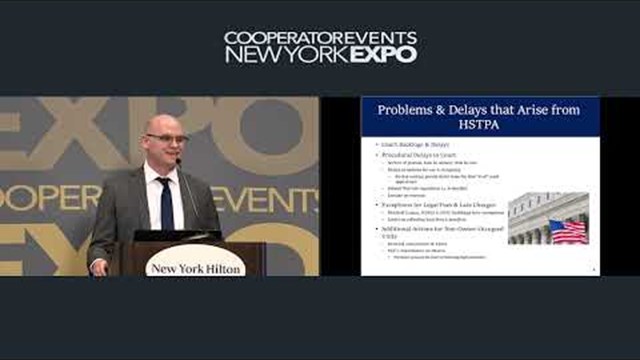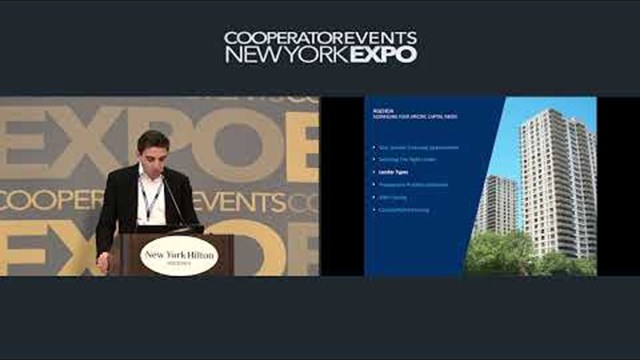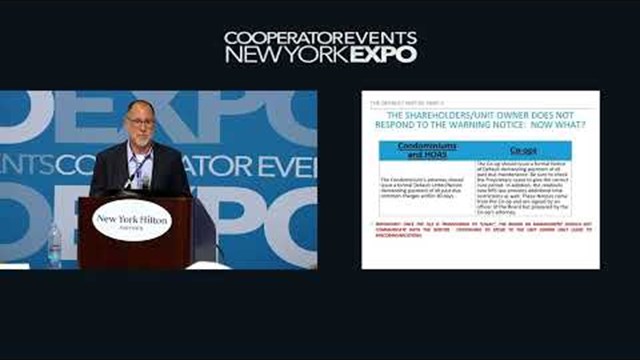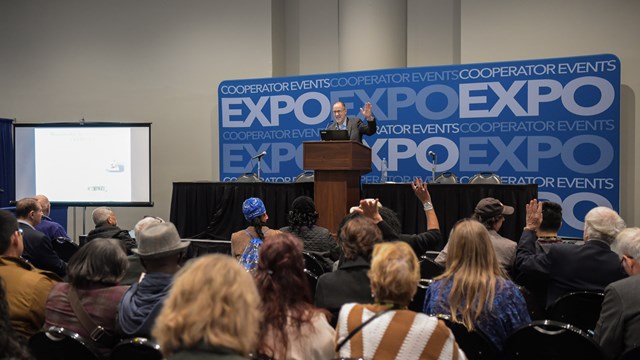When a condo or co-op resident runs for a seat on their board, the decision to do so generally comes from a desire to ‘step up’ and participate in the governance of the place they call home, and the building or association community as a whole.
Often, the residents willing to serve on their board aren’t necessarily those with finely-honed skills and formal education in law, finance, and practical business management. And they don’t have to be—with competent management, legal, and accounting professionals on their side, a board composed of ‘civilian’ members can absolutely meet its oversight responsibilities and run a solvent, functional building or association.
But having said that, it’s also worth considering that a solid, practical base of knowledge in law, finance and management can be invaluable to a board, enabling them to interact more confidently with contractors and other professionals, make prudent financial decisions, and understand the implications of legislation and legal decisions impacting their community.
A Little Knowledge…
Given that, what base of knowledge does a board member—especially a newly elected one—need in order to contribute most effectively to the administration of their community? Most experts agree that understanding financial reporting, and to a slightly lesser extent, the laws and regulations governing shared interest communities in their area are the biggest help.
“Revenue, minus expenses, equals net income,” says Jayson Prisand, an accountant and principal with Prisand Mellina Unterlack & Co, an accounting firm located in Plainview, New York. “That’s pretty much the starting point. The primary goal of maintenance or common charges is always to pay for expenses. It seems obvious, but if you don’t have the revenue, how can you pay for the expenses? Board members have a clear need to understand these basic processes. Cash and reserves and their differences are also important concepts in terms of short-, medium-, and long-term planning. Board members must know short-term concepts and goals for operating, and long-term concepts for capital projects. Especially in the current environment, they should understand inflation, and in New York City (and everywhere really), local regulations. It’s not an easy task.”
“Every board member needs to develop a basic skill set,” says Steve Silberman, a CPA and partner with PBG, a financial services firm located in Glenview, Illinois. “At a minimum, they need to learn to read and understand a financial statement, rather than just relying on the treasurer. The board has a fiduciary responsibility over the financial information of the association or corporation, so all the board members need to understand their finances.
“The other concept they need to understand is fund accounting,” Silberman continues. “Operating accounts are based on fund accounting. They must also understand what a reserve fund is. A major issue for boards is the possible co-mingling between operating accounts and reserves. That requires understanding the difference between accrual versus cash-basis accounting. Most board members, regardless of their overall knowledge of accounting, understand ‘cash-basis’ accounting, as that’s how a personal checkbook works; income is accounted for when received, and expenses accounted for when paid. By contrast, accrual is more true to [a community’s] current financial position, because it records income when earned and expenses when incurred.”
“Financial literacy,” says Mark Love, principal of M. Love & Associates, CPA, with three offices in Massachusetts, “requires knowledge of matters involving finance, accounting, budgeting, taxes, investments, insurance, debt, financial planning, capital planning, and even economics.”
Michael S. Simone, an attorney and principal of The Simone Law Firm, based in Cinnaminson, New Jersey, focuses in a little more: “Board members must ensure that their association has a budget, and then make certain to run a monthly budget variance report to monitor the progress of the budget throughout the year. Understandably, everyone wants dues to be as low as possible, but an association needs to avoid having too many special assessments. Having special assessments every year is a red flag indicating that the budget is not properly funded. Furthermore, given the current stricter mortgage regulations, an association that does not have a properly funded budget might result in a potential buyer not being able to obtain a traditional mortgage.” Understanding basic accounting and financial principles is necessary for this.
Are All Board Members Equal?
Do all board members require the same level of knowledge of financial, management, legal and accounting issues? In a word, no.
However, according to Prisand, “Those board members who don’t have the most in-depth financial knowledge shouldn’t necessarily be the treasurer. The treasurer should have a solid grounding in financial data in their background. That’s not to say they couldn’t otherwise do the job, but you’re managing money—everybody’s money. There is always reliance on the management company, but don’t give them carte blanche. Overall, at least one person on the board needs to have a more complete, more complex understanding of finances and financing.”
Love concurs. “To be sure, at least one board member, generally the treasurer or the president, should have a moderate to semi-high level of understanding and awareness of these financial matters.”
Another area about which board members should have basic technical understanding is what their governing documents say and require relative to the financial management and maintenance of the property. “The first thing every board member should look at and understand are the bylaws and declarations of their association,” says Silberman. “The bylaws, etc., hold information about financial audits, what to do with excess cash from operations, and other details of financial management under the laws and regulations governing the association.” A law degree is not necessarily required for this, but as with the treasurer’s position, it certainly doesn’t hurt to have an attorney on the board. If that’s not possible, the community’s legal counsel can be tapped to provide any needed clarification.
Training Available
There are several organizations whose mission it is to help educate board members in the unique aspects of governing a building or HOA—including this publication, and its companion annual and biannual Expos, which offer rosters of free educational seminars, expert panel discussions, and legal advice booths. (Visit coopexpo.com for more information, registration, and descriptions of seminars.)
Another valuable resource —and the largest U.S. organization devoted to board education—is the Community Associations Institute (CAI). “CAI has over 40,000 members,” says Simone. “Their courses are offered both online and in-person, and are an excellent way to learn more about the role of being a board member. Further there is a web forum group where associations post problems and issues they are being confronted with, which is another way to learn from other potentially similar association’s issues.”
Spreading the Knowledge
In cases where a building or association is fortunate enough to have an accountant, attorney, financial or real estate professional as a board member—or even as a non-board resident—is it advisable for that person to help board members understand what can often be complex matters? The answer might depend on the community.
One co-op shareholder on Manhattan’s Upper West Side who is a professional commercial mortgage broker shares anonymously that in the 30 years he’s lived in his building, the corporation has refinanced its underlying mortgage twice. On both occasions, while not serving on the board, this shareholder offered his expertise to review the refi and advise the board in their decision making. The board turned down his offer both times—and in his opinion, they made serious mistakes, including the prepayment clause on the original refinance some 20 years ago, which precluded the corporation from taking advantage of lower interest rates when they had the chance.
On the other hand, Silberman says, “Boards could and should take advantage of members’ knowledge base. Depending on the size of the community, they might also have a finance committee or subcommittee apart from the board that would allow those with financial background but not on the board to serve on that committee, thereby bringing more people with knowledge into the equation.”
Prisand cautions that sometimes a little knowledge can cause friction. “I work with all types of people on boards. Senior fortune-500 types to housewives. Sometimes those with knowledge can present a different kind of problem; they think at too high a level. It’s not plain vanilla—every building is different—but it’s important to keep it fairly simple.” In the end it ‘takes a village’ to effectively run a village.
A Pressing, if Not-so-New Issue
Another issue has come to the fore for boards in the aftermath of the deadly Surfside, Florida, building collapse in 2021: reserves, and reserve studies. The high dollar amounts—and high stakes—make this yet another area where board members need to have at least a working knowledge and basic understanding of both their building’s physical condition, and the financial planning needed to properly maintain it.
According to Silberman, “Boards should plan for a reserve study, and a plan for investment of those funds. They need an investment policy, and should understand the financial and accounting principles underpinning that policy, including why and how reserve money is invested, its safety and liquidity, and yield. If you’re funding a reserve project, you’ll have a better idea of why the money is invested the way it is.” That knowledge of investment strategy is a good partner to understanding the financial principles relating to your regular operations as well.
It all boils down to boards and board members being as informed as possible about what goes into governing and administering their community from day to day, from its physical upkeep to financial decision-making and long-term planning. Reading—and understanding—your governing documents, consulting your legal and financial professionals when necessary, and taking advantage of educational and training opportunities are all great ways to make the most of your tenure, and make your board the best it can be.
A J Sidransky is a staff writer/reporter for CooperatorNews, and a published novelist. He can be reached at alan@yrinc.com.










Leave a Comment